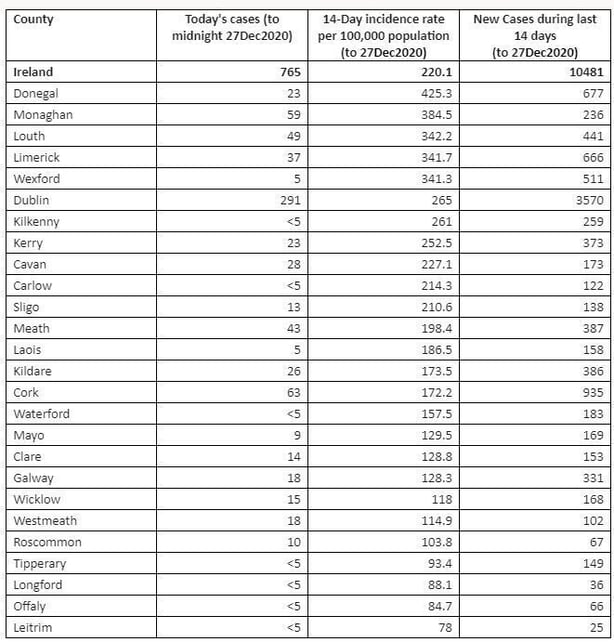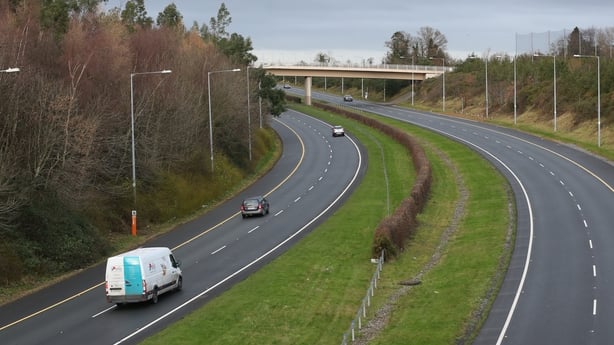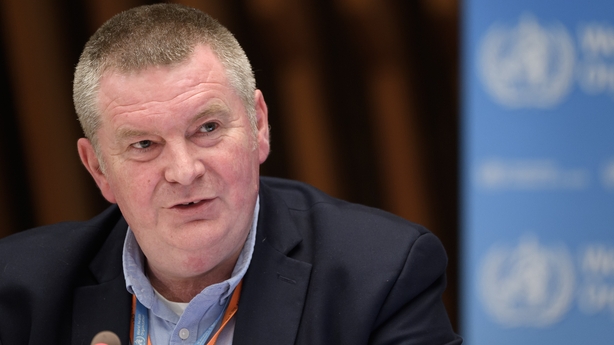There has been one further coronavirus-related death and 765 new cases reported to the Department of Health.
The number of people who have died with Covid-19 in Ireland now stands at 2,205, while the cumulative total of confirmed cases is 86,894.
The number of patients with the disease in ICU is 30, an increase of four since yesterday. There were 41 additional hospitalisations in the past day and the total number of patients with Covid-19 is now 359.
Chief Medical Officer Dr Tony Holohan said: "The data we are reporting today are lower than days up to 26 December. This, however, results from factors related to the time of the year, such as the lower rates of attendance and referrals and presentation for testing for several days over Christmas.
"We look at many metrics when monitoring the disease severity of Covid-19. Today we are reporting that we have now exceeded the cumulative number of people hospitalised in this third wave than in the second.
"Hospitalisations have increased sharply in the last two days. This is a concerning trend which reflects the sharp increase incidence we saw in the last 10 days."
The CMO warned: "We are also seeing a steep rise in the positivity rates in community testing with a seven day average of over 9.2% up from 5.2% on 18 December. This indicates that the virus is increasing its foothold out in our communities.
"This is just one more reason why we are strongly advising everyone to stay safely at home to avoid transmitting or catching this virus, as it continues to circulate widely."
The 14-day incidence rate per 100,000 population is now 220.1 nationally. Counties with the highest infection rates include Donegal (425.3), Monaghan (384.5), Louth (342.2) and Limerick (341.7).
Counties with the lowest rates are Leitrim (78), Offaly (84.7), Longford (88.1) and Tipperary (93.4).

Of the cases notified today 401 are men, 358 are women and 70% are under 45 years of age.
There were 291 cases in Dublin, 63 in Cork, 59 in Monaghan, 49 in Louth, 43 in Meath, and the remaining 260 cases were spread across all other counties.
We need your consent to load this rte-player contentWe use rte-player to manage extra content that can set cookies on your device and collect data about your activity. Please review their details and accept them to load the content.Manage Preferences
Professor Nolan from the National Public Health Emergency Team said the number of people in hospital was "earlier and faster" in the third wave of the pandemic compared to the second one in October.
"Cut your contacts to a minimum," he urged in a post on Twitter.
The number of people in hospital with COVID-19 is increasing; and it's earlier and faster in the third wave compared to the second. 360 in hospital today; the October peak was 354. It's really hard, but protect each other and our health services: cut your contacts to a minimum. pic.twitter.com/UvAx7fdCGl
— Professor Philip Nolan (@President_MU) December 28, 2020
Earlier today, the Health Service Executive's Chief Clinical Officer said for the vaccine programme to be successful, it is not just a question of speed but of safety.
Dr Colm Henry said vaccinations at the 582 nursing homes around the country will begin on 4 January.
Tomorrow will see the first Pfizer BioNTech vaccines administered in acute hospital settings in Cork, Galway and Dublin.
Tánaiste Leo Varadkar said vaccinations would start in acute hospital settings to "build confidence" before moving to nursing homes next week.
He said medical experts in the National Immunisation Advisory Committee (NIAC) wanted vaccines to start in such settings in the unlikely event that something went wrong, such as allergic reactions.
We need your consent to load this rte-player contentWe use rte-player to manage extra content that can set cookies on your device and collect data about your activity. Please review their details and accept them to load the content.Manage Preferences
About 40,000 doses a week of the Pfizer BioNTech vaccine are due to be delivered in Ireland throughout January. That would result in 3% of the population being inoculated in the first month of the year, Leo Varadkar said.
10,000 doses received on 26 December will be used at Beaumont and St James's hospitals in Dublin, Cork University Hospital and Galway University Hospital this week.
Dr Colm Henry said the rollout can only begin once all safety protocols are followed, which includes education and consent around the vaccinations.
Speaking on RTÉ's Morning Ireland, he said nursing homes present "particular complexities in terms of rollout of the vaccine".
"It's not just a question of speed but of safety".
HSE's Dr Colm Henry says nursing homes present "particular complexities in terms of rollout of the vaccine". He says it's not just a question of speed but of safety pic.twitter.com/0nlF72ei96
— RTÉ News (@rtenews) December 28, 2020
The country is now into a third surge, he said, and the demand for tests is rising.
On 22 December a record number of 23,000 tests were carried out.
He said activity over the Christmas period shows there is increased demand for testing.
"The virus is very active out there in the community and it is replicating, there are multiple outbreaks".
HSE's Dr Colm Henry says activity over the Christmas period shows there is increased demand for testing. "The virus is very active out there in the community and it is replicating, there are multiple outbreaks" pic.twitter.com/0Oh3g6UHGF
— RTÉ News (@rtenews) December 28, 2020
Dr Henry also revealed that there has been no lab diagnosed influenza cases detected this season.
Prioritising residents and workers in long-term residential facilities is in line with NPHET's recommendations, Dr Henry added.
Tánaiste @LeoVaradkar says Level 5 only came into effect 24 Dec and those restrictions won't be reflected in a fall in case numbers until the first or second week of January #Covid19 pic.twitter.com/ubc6DMtC9o
— RTÉ News (@rtenews) December 28, 2020
The Tánaiste said the latest figures for coronavirus cases have been artificially low as a very small number of people attended for tests around Christmas Day and St Stephen's Day.
Mr Varadkar said he expects to see cases rise until the early New Year, before hopefully seeing a drop.
The availability of the vaccine "does change things", he told Morning Ireland, and they can now "foresee the point" at which they will have vaccinated those most at risk.
"I think there would be a case of saying to the Irish people that we should keep these restrictions in place until such a time that we have protected our healthcare workers and most vulnerable.
The availability of the vaccine does change things now, says Tánaiste @LeoVaradkar, adding that if restrictions are going to be in place for a prolonged period they need to be sustainable pic.twitter.com/s7W6MTKPqg
— RTÉ News (@rtenews) December 28, 2020
"But that also needs to be reflected in the kind of restrictions that we put in place because they need to be sustainable for a prolonged period if they're not just for three or four weeks."
Mr Varadkar said restrictions will be reviewed as planned on 12 January, but he does not envisage them being relaxed then as cases may "not have fallen enough".

Asked if the start of the Covid-19 vaccination rollout marks the beginning of the end of the pandemic, Mr Varadkar said "I believe it does".
He said the rollout of the vaccine will be slow at first but will be extended over the course of the next few months.
It will "ramp up quickly" throughout February and March as additional vaccines become available, he added.
Mr Varadkar also said the aim is to open schools as intended in early January, with "no plans" to reconsider that.
"The advice that we have at present is that opening schools works successfully and that these are relatively safe environments."
Meanwhile, Professor Karina Butler, chairperson of the National Immunisation Advisory Committee, said "we don't know for definite" if the vaccine works on the new strain of Covid-19, but early studies indicate "it doesn't seem that it is going to interfere with the vaccine".
She confirmed the Covid vaccine will initially be administered only in hospitals in Ireland, following "some early, possibly serious reactions" to the vaccine in the US and UK.
Speaking to RTÉ's News at One, she said while an acute allergic reaction of one in 1.3 million doses is usual with vaccines, "this seems to be a little bit more common than that".
In light of this, a decision was made - "let's just target areas where everything is on hand, should there be any adverse event".
She said this is why the vaccine will be delivered only in hospital settings at first and she added that "all vaccinators are well trained in the management of anaphylaxis" (serious allergic reaction).

Not enough known yet about how long vaccine offers protection - WHO
Dr Mike Ryan, Executive Director of Health Emergencies Programme at the World Health Organization, has said not enough is known yet about the length of protection offered by Covid-19 vaccines.
At a briefing this evening, Dr Ryan said that the second phase of the vaccine rollout will examine how it will effect transmission of the virus.
He said the main objective of the vaccine is to prevent severe illness and deaths and protect healthcare workers.
"That will be a major step forward in bringing the world back to some kind of normal."
However, looking to eradicate the virus would require a much higher degree of efficiency and effectiveness in a vaccination programme, he warned.
Dr Ryan said the likely scenario is that Covid will become another endemic virus, that will remain "somewhat of a threat but a very low level threat" in the context of an effective global vaccination programme.
While this pandemic has been very severe and "a wake up call ... this is not necessarily the big one, this virus is very transmissible and kills people... but its current case fatality rate is reasonably low in comparison to other emerging diseases".
The briefing was led by Director General of the WHO Dr Tedros Adhanom Ghebreyesus.
He said the WHO is working with scientists in the UK and South Africa to monitor new strains of the virus found there.
"Science drives our actions, and I would like to thank both those countries for testing and tracking new variants," said Dr Tedros.

